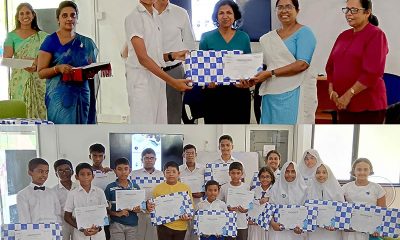Editorial
No general election first

What President Ranil Wickremesinghe had told his ministers at their meeting last week, according to what spokesman Bandula Gunawardane told the post-cabinet news briefing, as well as other published reports, is that he does not intend dissolving the incumbent parliament before the upcoming presidential election is concluded. This is a clear signal that he is not going to fall in with SLPP founder and strategist Basil Rajapaksa’s demand that a parliamentary election be first held before the presidential contest later this year. While it is not known whether a parliamentary election first is a Rajapaksa demand with the whole family united behind it or whether it’s purely a BR initiative, as it is not likely that Basil is breaking ranks with the family.
But the president’s stance has not altogether ruled out a general election in the short term. If Basil Rajapaksa still calls the shots among the MPs elected last time around on the SLPP ticket, he should be able to muster the 113 votes necessary to compel the dissolution of parliament and a general election thereafter. All that will take, according to the constitution, is a simple majority of the 225-member legislature. But the SLPP is no longer what it was when it won a two thirds majority at the last general election in August 2020. Large chunks of the party have peeled off the parent since the araglaya forced out both President Gotabaya Rajapaksa and Prime Minister Mahinda Rajapaksa from office. The breakaways have their own agenda and will certainly not obey an SLPP or BR whip.
Quite apart from that, there are many sitting MPs who have not yet completed five years of parliamentary service which would entitle them and their widows to a lifetime pension. So there are very good reasons why they will not support an early dissolution before the due date in August 2025. While President Wickremesinghe has still not declared his own candidature for whatever reason, his intimates have made very clear that he will be a runner. Much of what is happening in the country right now such as the 10 kilos of rice monthly handout to the poor, the school meal, the Rs. 1,700 daily wage for plantation workers, and the president’s statements in Jaffna last week on upgrading the Jaffna hospital and the medical faculty of the Jaffna University and much more are clear pointers to pre-poll vote gathering now evident.
The SLPP has said they are running a candidate but not said that it will be Wickremesinghe whom they first appointed prime minister, replacing MR, and then elected president to complete GR’s balance term. Nor has the party named any other candidate. RW too will not run under the elephant or lotus bud symbol as he’s seeking a broader alliance. A recent unconfirmed report said that Namal Rajapaksa had phoned the president to say he will be running for president. It said that Wickremesinghe had wished Namal, whose father not long ago said had “more time,” good luck. Billionaire businessman Dhammika Perera is known to be waiting in the wings hoping for the SLPP ticket. The presidential ambitions of Field Marshal Sarath Fonseka, chairman of the SJB, who’s recently been distanced from Sajith Premadasa, have also resurfaced.
Only two runners, Sajith Premadasa and Anura Kumara Dissanayake have declared their candidature until now. Wickremesinghe has show in many ways, short of actual declaration, that he’s a contender. Calculations of many politicians presently in parliament is focused on how best to ensure their re-election – whom to back in the presidential race, which party’s ticket will best serve their personal interest among other factors. No doubt the picture will further clarify in coming weeks when Wickremesinghe plays his hand and the Elections Commission sets a polling date for the presidential election. Until then it is a matter of ‘wait and see’ for the electorate.
Commemorating the war dead
Amnesty International’s Secretary General Agnes Callamard was in Sri Lanka last week in connection with the commemoration of the end of the country’s near 30-year long civil war. Predictably, her visit to the Mullivaikkal memorial site commemorating the war dead ruffled many feathers. She met President Wickremesinghe the day she arrived here and was assured the government was not interfering with memorial events. This was true as far as the Mullivaikkal was concerned although the presence of surveillance personnel in civvies was noted. But elsewhere, including in the Batticalloa campus of the Eastern University, such events were not permitted. This year, as in the past, there were events like serving kanji on the streets and even on the Wellawatte beach, some resisted by police armed with court orders, and others permitted.
The Federation of National Organizations (FNO), led by Dr. Gunadasa Amarasekera, publicly found fault with former presidents Mahinda and Gotabaya Rajapaksa as well as the SLPP for turning a blind eye to Callamard’s visit, calling it a “betrayal” of the war winning armed forces. Among the signatories to the FNO statement were two sitting MPs, Rear Admiral (Retd.) Sarath Weerasekera who was elected on the SLPP ticket and Gevindu Cumaratunga who entered parliament on the SLPP national list. Several several former senior military officers too signed this statement. It is debatable whether this subject 15 years later generates the same passion it did during wartime.
The anniversary of the end or the war and the connected events have been controversial over a long period of time. There are those who argue strongly that the Sri Lankan state had not interfered with JVP organized commemorative events for Rohana Wijeweera but had adopted a different stance over such events organized by Tamils. While the name Prabhakaran remains a dirty word in Sri Lanka, he is memorialized in countries with a strong diaspora presence like Canada in what is perceived as ‘vote bank politics.’ It must be acknowledged that even some LTTE combatants who died in the fighting were child soldiers forcibly conscripted by the Tigers. Is it fair then to deprive their families of publicly remembering them?
Editorial
Hobson’s choice

Monday 17th June, 2024
The SLPP-UNP government is crowing about the release of the third tranche of the IMF loan, and has undertaken to fulfil some more bailout conditions such as the introduction of an imputed rental income tax. It has said the new tax will affect only the high-net-worth individuals, but the proof of the pudding is said to be in the eating. We will see what the new tax is really like only when it is implemented. The SJB and the JVP/NPP have vowed to renegotiate the IMF agreement in case of winning the next presidential election so much so that it is being speculated in some quarters that a regime change might lead to a derailment of the ongoing IMF programme.
The IMF has addressed some concerns being expressed about the continuity of its programme in view of the next election here. IMF Chief of Mission for Sri Lanka Peter Breuer has revealed what the IMF expects Sri Lanka to do. Pointing out that it had made good progress in terms of economic recovery, he told the media the other day that it was not yet out of the woods. He stressed the need to ‘safeguard the hard-won gains, and avoid slipping into another crisis’.
As for the concerns about the future of the IMF bailout programme here, he said the IMF’s perspective was that achieving its programme’s objectives was the key priority to give Sri Lanka a chance to emerge from the current crisis; the IMF was willing to listen to different views on how those objectives can be achieved and alternative proposals needed to be realistic and achievable within the timeframe of the programme. Reading between the lines, it will be a case of Hobson’s choice for Sri Lanka whoever wins the upcoming presidential election.
The IMF programme, at the present stage, requires Sri Lanka to do basically two things—expediting external debt restructuring and increasing state revenue substantially. These conditions make economic sense, and have to be met, however difficult they may be. Thankfully, external debt restructuring is said to be on course, but the revenue targets have not been achieved yet. The IMF has set guidelines, and the incumbent government or a future administration will have to meet the specified revenue goals.
What one gathers from Breuer’s observations is that the IMF does not mind the means to that end. If the government streamlines revenue collection by giving Inland Revenue, the Customs, the Excise Department, etc., a radical shake-up, while casting the tax net wide with action being taken to ensure compliance and curtail widespread waste, it will be able to achieve the revenue targets set by the IMF without heaping more burdens on the public. But it has opted for the easiest way out––squeezing the ordinary public dry.
The main presidential candidates from the Opposition have given an undertaking that they will continue with the IMF bailout programme but with some changes thereto. However, their economic policies, as outlined in their leaders’ speeches are populist and unrealistic; they are based on lofty ideals and clientelism rather than the harsh economic reality and drastic action that has to be taken to prevent the economy from going into a tailspin again.
The UNP is no different; it is giving away rice, etc., and promising much more in case of winning the next presidential election. The SJB is raising funds and spending part of it on donations such as buses and smart classrooms for schools. It is promising tax reductions and far-reaching welfare measures such as a mid-day meal programme for schoolchildren in case of being able to secure the executive presidency. The JVP/NPP is collecting funds both here and overseas while giving away nothing. It is only promising to create what can be described as a welfare state if it is voted into power.
Given the situation the country finds itself in and the tough bailout conditions it has to fulfil to emerge from the current economic crisis, all chances are that the prospective presidential candidates’ promises of delivering the public from suffering overnight will be pie in the sky.
Editorial
Egg on the face

Egg on the face or the Emperor’s new clothes? Pick what you will. Both the president and his government has made a song and dance about a Rs. 1,700 daily wage for plantation workers with President Ranil Wickremesinghe announcing it on May Day at a Ceylon Workers Congress (CWC) rally at Kotagala. Shortly thereafter Labour Minister Manusha Nanayakkara gazetted the wage increase and the matter appeared all done and dusted. But voila! The country was last week treated to the revelation that the state-owned Janatha Estate Development Corporation (JEDB) and the State Plantation Corporation (SLSPC) are not paying the stipulated wages. The exception was Elkaduwa Plantations Ltd., also state owned, which is paying what they must in accordance with the government diktat.
Sad but true, the CWC which has for long been the country’s biggest trade union and a strong political force representing plantation workers of Indian origin has said nary a word about the failure of government in this regard. Whether Mr. Jeevan Thondaman, the union’s general secretary and a cabinet minister in President Wickremesinghe’s government, has raised this matter at the highest levels, we do not know. His cousin, Senthil Thondaman, is the Governor on the Eastern Province and is the leader of the CWC. He too has easy access to the powers that be. It is not only the JEDB and SLSPC that have not been paying the decreed higher wages. Several of the Regional Plantation Companies (RPCs) are also not paying them although a few do comply. So also private proprietary estates and smallholdings hiring labor.
Jeevan Thondaman made waves a few days ago when he and a group of supporters illegally threw their weight about at Pedro Estate, Nuwara Eliya, belonging to Kelani Valley Plantation PLC (KVPL), a Hayleys company. Acting like thugs, they assaulted a fellow employee and demanded the reinstatement of three workers suspended for creating disturbances over land preparation for planting coffee on unproductive tea land. They threatened arson against company property and held plantation executives hostage for several hours. One of them had to be hospitalized.
The Planters Association (PA), in a strongly worded statement, accused Thondaman of forcibly trespassing on the estate, blockading it, and illegally detaining plantation employees and executives against their will for a “harrowing four hours.” It further said these employees were surrounded by a drunk and unruly mob and were subjected to prolonged threats of bodily harm and arson if they did not accept the minister’s demand to immediately reinstate the three suspended workers. Thondaman, like all ministers, is provided with an armed security detail belonging to the Ministerial Security Division (MSD) of the police. There has been an unconfirmed report that the MSD, on orders from the top, withdrew and Thondaman had later apologized to Public Security Minister Tiran Alles for the incident.
Quite apart from not paying the government mandated daily wage to their workers, the state owned plantation companies are also guilty of not paying Employees Provident Fund (EPF) and Employees Trust Fund (ETF) dues for decades. Elkaduwa which is now paying the higher daily wage is bracketed alongside the SLSPC and JEDB in this regard. Massive arrears have built up and State Minister of Finance, Ranjith Siyambalapitiya recently went on record that cabinet had approved five billion rupees to be allocated to clear these dues. “This comprehensive settlement aims to rectify the financial neglect experienced by estate workers and their families,” he said. He added that some workers did not have money to by medicines and had died. There were some 2,000 cases filed over this matter. But he did not indicate whether the state-owned enterprises will be subject to the penalties normally imposed on EPF and ETF defaulters.
Employers falling back on these payments are liable to hefty penalties. While the ETF is solely an employer liability, both employers and employees contribute to the EPF with the employee contributions deducted from wages. The big question here is whether such payments have been deducted and not credited to the workers’ accounts as frequently happens in the case of such defaults. Penalty-wise, is it a case of sauce for the goose and not sauce for the gander?
The Court of Appeal last week denied an injunction sought by 21 Regional Plantation Companies seeking to suspend the implementation of the wage hike. An Additional Solicitor General submitted that the RPCs boycotted a Wages Board meeting convened to discuss the matter and the Labour Commissioner, exercising the powers assigned to the Labour Minister, had taken legal steps to increase wages. The matter remains not concluded as far as court action is concerned. The PA insists that it has no option but continue to resist what it calls a “sudden wage increase.”
It stresses that wages must be intrinsically linked to productivity to ensure sustainability of businesses and the livelihood of workers. Sri Lanka is already grappling with the highest production costs, wages and lowest productivity among all tea growing nations, the PA claimed. It said the newly gazetted wages, notably, is double that of India, creating significant cost disparities. Further, the unilateral increase affects not only the RPCs but also over 400 private tea factories. Whether politicians looking at a bloc of plantation votes at the forthcoming elections will be influenced by these arguments or whether they can be sustained in the courts remains to be seen. The government has already adopted a “pay up or get out” approach. Can it wave its fist at the RPCs when it does not itself pay the mandated wages and defaults on EPF and ETF obligations? Also can it take back the estates and run them viably or find alternate investors? The country has already burnt its fingers by nationalizing the estates.
Editorial
Kukul Chaminda and his ilk in kapati suits

Saturday 15th June, 2024
The Sri Lanka police are known for their efficiency, which is unfortunately selective in most cases. They swing into action and make arrests in double quick time when lawbreakers happen to be ordinary people. They even act on social media videos—and rightly so—in arresting suspects. A few weeks ago, they swooped on a street food vendor in Colombo for turning abusive towards a foreign tourist who refused to be overcharged. The suspect was produced in court and bailed out.
A wicked stepfather, known as Kukul Chaminda, was arrested for assaulting a small child of his mistress. His wife, his paramour and a person who provided them with shelter while they were on the run were arrested. Another stepfather from hell was remanded the other day after being arrested for assaulting a nine-year-old girl brutally.
Curiously, no arrest has so far been made over a high-profile assault incident, at the Presidential Secretariat, where government MP Gunathilaka Rajapaksha suffered a leg injury on 02 June. He has said MP Mahindananda Althugamage set upon him after a government group meeting, chaired by President Ranil Wickremesinghe. He has found fault with the police for dragging their feet on his complaint. He has called for Aluthgamage’s arrest.
MP Aluthgamage has vehemently denied Rajapaksha’s allegation. He has said he had nothing to do with the incident. It will not be difficult for the police to examine the CCTV footage of the incident and ascertain the truth or otherwise of MP Rajapaksha’s claim. Nearly two weeks have elapsed since the incident, and the police continue to trot out lame excuses for the tardy progress in their investigation into Rajapaksha’s complaint. The Police Spokesman has come up with some absurd reasons for the delay in concluding the probe, and they were an insult to the intelligence of the public.
The police are apparently under pressure from the powers that be to delay the probe until the issue fizzles out, for action against the alleged assailant at this juncture will open a can of worms for the ruling coalition. The fact that the government is all out to hush up the incident became clear when MP Rajapaksha, who suffered a serious leg injury, was rushed to the military hospital, of all places.
MP Rajapaksha has said he will reveal everything about the alleged assault when he returns to Parliament after convalescence. But he will be mistaken if he thinks any action will be taken based on his complaint. He cannot be unaware that even the MPs who went berserk in Parliament in late 2018, assaulting their rivals and the police, damaging desks, chairs and microphones, and even menacingly lunging towards Speaker Karu Jayasuriya, who had to be whisked away, got off scot-free.
There was a live telecast of that stormy parliamentary session and the public saw the troublemakers in action. Those violent characters should have been arrested and prosecuted for their violence and damaging public property, a non-bailable offence. A fish is said to rot from the head down, and when the lawmakers break the law with impunity, in Parliament itself, it is well-nigh impossible to restore the rule of law in the country at large. So, let MP Rajapaksha be warned to brace himself for a huge disappointment. His political bosses may even force him into silence.
President Wickremesinghe is the Minister of Defence and Commander-in-Chief of the armed forces, and if an alleged assault on a government MP inside his Secretariat cannot be probed expeditiously, how can the public expect the government to ensure their safety and combat crime. Shouldn’t the President order the police to get cracking?
The plight of Kukul Chaminda’s little victim would not have come to light but for an intrepid boy who videoed the heart-wrenching incident and released the footage to the media. The police rewarded him. Likewise, the CCTV footage of the government group meeting and MP Rajapaksha’s fall, on 02 June, will help figure out what actually happened. One can only hope that the police will not claim that the CCTV recording is not clear or has been deleted.
-

 Business2 days ago
Business2 days agoSLT-MOBITEL & STEMUP Educational Foundation successfully complete first batch of “CoderDojo”
-

 Business5 days ago
Business5 days agoDialog takes personalisation to new heights with AI-driven greeting cards, powered by Star Points
-

 Business4 days ago
Business4 days agoRansomware menace plagues Sri Lankan businesses: Kaspersky
-

 Business2 days ago
Business2 days agoPRCA Country Rep calls for ethics and standards in Sri Lanka’s advertising and marketing industry
-

 Fashion1 day ago
Fashion1 day agoKhalida, young entrepreneur plays colours and textures
-

 Business3 days ago
Business3 days agoDialog launches cutting-edge 4G vehicle tracking solution
-

 Features6 days ago
Features6 days agoThe digital divide: AI and its implications for higher education in Sri Lanka
-

 Life style1 day ago
Life style1 day agoMinor Hotels Introduces NH Collection and NH Brands in Sri Lanka

























